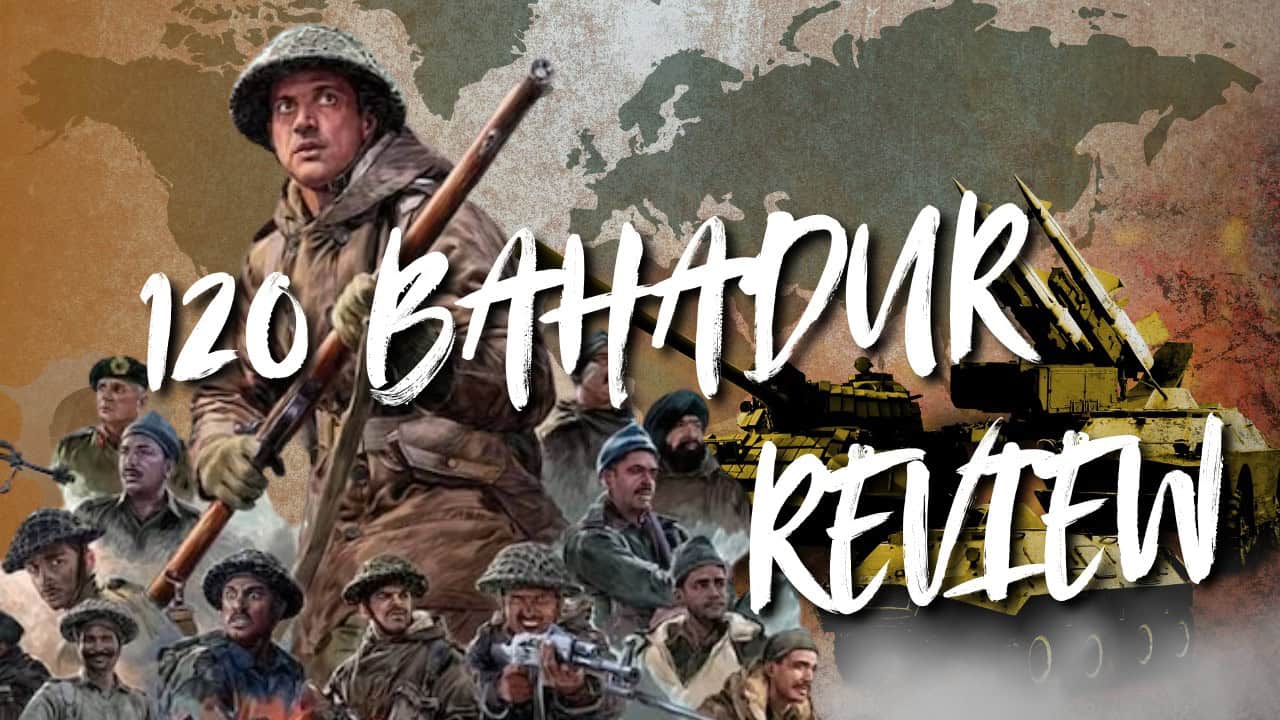120 Bahadur Review
War films are almost always emotional, but stories about heavily outnumbered soldiers carry a different kind of weight. 120 Bahadur builds itself around exactly that kind of premise: a small group of 120 Indian soldiers facing an enemy force of 3,000 during the 1962 conflict. On paper, it’s the kind of setup that promises an unforgettable, heroically tragic war film.
What we actually get is a sincere, often moving, and mostly grounded film that has several powerful moments – but it never fully transforms into the breathtaking epic its premise deserves.
A Goosebump-Inducing Start
The film starts on a very strong note. The opening voiceover by Amitabh Bachchan immediately sets the tone. His deep, familiar baritone doesn’t just narrate; it almost commands attention. From the very first minute, you feel the seriousness of what’s about to unfold.
That opening genuinely gave me goosebumps. It feels like the film is clearing its throat and saying, “This is important. Listen.”
Farhan as “Shaitan”: A Promising, Grounded Performance
Farhan Akhtar plays the commanding officer as “Major Shaitan” and he fits the role quite well.
His entry is handled sensibly and logically. There’s no over-the-top slow motion, no explosion-filled hero moment. Instead, it feels like a natural extension of the story – a leader walking into a situation he’s duty-bound to handle. That grounded approach suits both the character and the genre.
Farhan’s performance itself is quite strong. He comes across as calm, composed, and believable as a Major leading men into a hopeless situation. When he speaks, there is authority without unnecessary theatrics, and when he fights, it feels like a soldier doing his job rather than a superhero trying to steal the frame.
This is, however, not the first time we’ve seen Farhan in a uniform or in a role connected to the armed forces. And if I’m honest, his turn in Bhaag Milkha Bhaag still remains his most memorable performance in that larger “disciplined uniformed man” space. In 120 Bahadur, he is good – very good at times – but the material doesn’t quite give him enough to top his earlier work.
Writing & Dialogue: When Realism Clashes with Tone
The writing aims for realism, especially when portraying conditions in 1962. The film repeatedly highlights how under-equipped the Indian soldiers were at the time:
Soldiers are shown fighting over something as small as a chocolate
They lack proper winter jackets despite the harsh conditions
The first time these details appear, they hit hard. They serve as a grim reminder of how much our soldiers have endured with limited resources. But the film keeps returning to this same point again and again. After a while, it begins to feel a bit repetitive, as if the movie doesn’t trust the audience to grasp the idea the first time.
One particular line also stands out for the wrong reason: the dialogue that essentially says,
“You’re an Ahir, so of course you must like to fight.”
In an army context – where uniforms are meant to erase caste, community and religion – this line feels too religious and community-specific. It clashes with the otherwise universal, brotherhood-driven tone that a film about soldiers ideally aims for. It’s a small moment, but it leaves a noticeable discomfort.
The Heart of the Film: Soldierly Banter and the Weight of Their Struggle
Where the film really clicks is in the camaraderie among the soldiers.
The informal banter between them – the teasing, the jokes, the shared frustrations – feels authentic. These conversations do more than just fill time; they humanize the soldiers. Before they become numbers in a lopsided battle, the film ensures you see them as individuals with quirks, friendships, and fears.
There is a larger emotional truth woven in throughout:
Everyone struggles in life, but a soldier’s struggle almost always brings tears to the eyes.
120 Bahadur doesn’t always spell this out directly, but it shows it again and again – in the way the soldiers miss home, in the way they deal with lack of resources, and in the quiet moments before the storm of battle. These are some of the best parts of the film.
Pacing Problems: A Late Start to the Action
Structurally, the film is a bit uneven.
The first major fight sequence starts quite late in the narrative. Until that point, the movie is not exactly boring – the world, the characters, and the dynamics are being set up – but it also doesn’t feel particularly thrilling. You keep waiting for the story to move into the high-stakes zone that the premise promises.
Because it is so clear that the core of the film is the 120 vs 3,000 showdown, much of the build-up feels like a long lead-in to that single event. You sit there with a very simple piece of math in your head:
3,000 divided by 120 is about 25.
For the odds to even out, each soldier would theoretically have to take down around 25 enemies.
It’s a powerful thought, and it creates its own kind of tension. The problem is that the film takes just a bit too long to reach the moment where that tension truly pays off.
The Final Battle: Realistic, Respectful… but Not Fully Breathtaking
When the battle finally begins, 120 Bahadur does a lot of things right.
The action is staged in a fairly realistic manner. There is no cartoonish invincibility, no superhero physics. The gunfire, the chaos, the soldiers’ movements – it all feels grounded. Farhan, as the Major, shines here: he is not just firing a gun; he’s leading, making calls, trying to hold his men together as they face impossible odds.
There are several strong moments in the fight – individual beats where bravery, fear, sacrifice and desperation blend effectively. At times, you genuinely feel the crushing disparity in numbers and the determination of these 120 men who refuse to back down.
And yet, for all its sincerity and realism, the climactic battle doesn’t quite become as breathtaking as it could have been.
It feels as if the makers chose to stay so close to restrained realism that they shied away from a bit of cinematic boldness. With a premise this dramatic, the film could have taken a few more creative liberties in terms of visual storytelling, sound design, and emotional build-up to make the climax truly unforgettable, without disrespecting the real-life inspiration behind it.
Instead, what we get is a battle that is good, solid, and respectful, but rarely awe-inspiring.
Final Verdict
120 Bahadur is a film with its heart firmly in the right place. It respects its soldiers, it honours their struggle, and it tries to show the harsh reality of war and under-preparedness rather than glorifying everything in a glossy, larger-than-life way.
- The opening narration by Amitabh Bachchan is genuinely spine-tingling.
- Farhan Akhtar delivers a strong, steady performance as a Major, even if the role doesn’t surpass some of his past work.
- The banter and bonding among the soldiers are engaging and emotionally effective.
- The film’s depiction of the soldier’s struggle is touching and often moving.
On the flip side:
- The first action sequence comes too late, which affects the overall momentum.
- The script over-emphasizes the lack of resources to the point of repetition.
- Certain dialogues, especially those with a religious or caste tone, feel out of place in an army setting.
The final battle, while realistic, doesn’t quite reach the “jaw-dropping” level that its 120 vs 3,000 premise sets up.
In the end, I’d call 120 Bahadur a sincere and affecting one-time watch. It may not become an all-time classic war film, but it does succeed in reminding us of the extraordinary courage of ordinary soldiers – and that, in itself, is worth a salute.






Leave a Reply